STANDING FOR SAFETY
Addressing violence in the health care workplace takes a team


Addressing violence in the health care workplace takes a team

HISTORIC milestones were celebrated at HEU’s 33rd biennial convention, with strong themes of equity and solidarity, as more than 600 HEU members gathered in-person Oct 17-21 to set the direction of the union for the next two years.
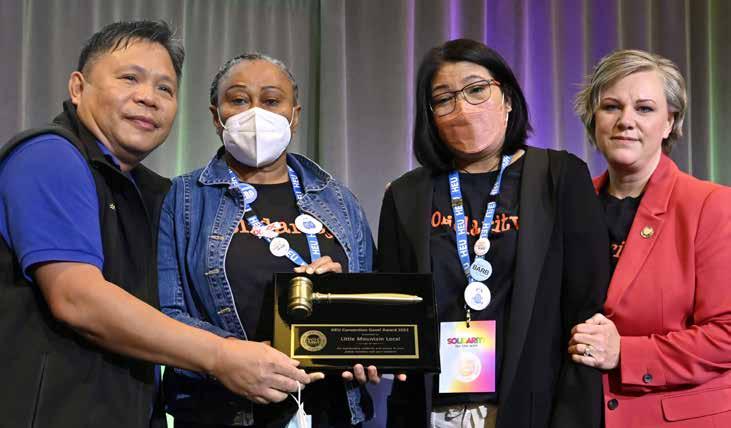
Six new diversity vice-president (DVP) seats were added to the PE (Provincial Executive), the governing body of the union. Delegates to the 2021 convention had voted to create these positions as part of the union’s commitment to diversity, equity and inclusion.
HEU president Barb Nederpel and financial secretary Betty Valenzuela were re-elected to their third terms in office. A total of seven at-large positions, 13 regional vice-president positions, and six diversity vice-president positions were elected. See page 10 for a full list of elected PE members.
Delegates also put equity first in many constitutional amendments and resolutions – the rules and policies that govern and guide the union. This included a resolution to support members speaking their mother tongue or non-English language during shift breaks without reprisal from employers.
In addition, delegates voted to continue to lobby for clean drink-
ing water in rural and Indigenous communities, reconfirmed HEU’s commitment to increased access to abortion services in rural and remote communities, and prioritized addressing the opioid crisis, safety and affordable housing.
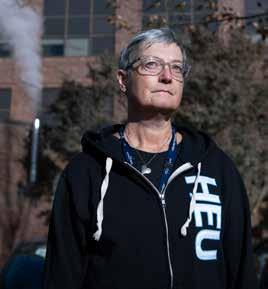
Delegates also supported timely access to mental health supports to everyone covered by MSP, and called on the federal government to take responsibility for accessible and affordable post-secondary education.
A resolution was passed to construct a permanent territorial acknowledgement marker at each of the union’s regional offices to recognize the traditional First Nations territories on which the offices are located.
And in a demonstration of solidarity within the union, delegates passed a resolution to provide an annual $1,500 supplement to locals with 500 members or fewer, to balance the needs of differently sized locals.
On the final day of convention, outgoing B.C. Premier John Horgan and other speakers joined to celebrate the return of contracted support services workers to the public sector.
Premier Horgan recalled seeing the impact of the mass firings 20 years ago, meeting HEU members while campaigning on Vancouver Island. “That’s when I
truly felt the depth of the cruelty that the BC Liberals had inflicted on health care workers,” he said.
HEU secretary-business manager Meena Brisard added, “this was a hard-won victory by a generation of HEU members to right a great wrong – to reverse privatization and contracting out.”

Delegates unanimously passed a resolution to continue campaigning to repatriate all contracted-out workers in health care, including those working at P3 sites.
Several awards were also presented to HEU activists for their contributions to their workplaces, union and communities. The convention gavel was presented to the Little Mountain local for their work during the devastating COVID-19 outbreak at their work site – one of the worst in Canada.
“What is so important about the work of your union is that you stand up every day, not only for each other, but for all British Columbians,” said Jennifer Whiteside, Minister of Mental Health and Addictions and HEU’s former secretary-business manager, and one of many guest speakers.
“To ensure we have a public health care system that provides high-quality accessible health care is critical,” she said.
LORETTA LAURIN
Long-term care needs a long-term fix. And we will continue to campaign to restore common standards in seniors’ care.
AS WE BRING 2022 to a close, I am reflecting on the incredible progress our union has made over the past year. The determination of HEU members to improve their working conditions, and by extension, the caring conditions of their patients, residents and clients, is inspiring.
In October, HEU members in the Facilities Bargaining Association (FBA) ratified a new collective agreement that includes the richest wage increases in the public sector anywhere in Canada in years and which set the stage for subsequent agreements in the public sector.
This new agreement guarantees that thousands of new health care workers will be added to the frontlines, provides new health and safety protections, and builds a more inclusive workforce for the future.
We also celebrated a historic victory, bringing thousands of contracted support services workers back into public health authorities. Reuniting the health care team has been the work of a generation of HEU activists who organized, bargained and campaigned for nearly 20 years to make this happen.
In 2023, we’ll be bringing our contracted members at P3 hospitals back in-house too.
Members in our independent long-term care sector also continue to negotiate agreements with private and non-profit employers. This year, HEU concluded 50 rounds of independent bargaining, including 12 first collective agreements.
Our union is getting things done, and unorganized health care work-

ers are noticing. Nearly 1,200 new members across 15 locations joined HEU over the last year.
And we know we still have work to do. One in three long-term care facilities in B.C. is a for-profit business and there continues to be much sub-contracting of care and support services across the sector.
These private companies squeeze out profits by keeping wages and benefits low and reducing staffing levels. The good news is that wage levelling will continue, ensuring that workers in this sector will be paid at the higher provincial standard.
But long-term care needs a long-term fix. And we will continue to campaign to restore common standards in seniors’ care.
Addressing this injustice is at the heart of HEU’s Care Can’t Wait campaign. In 2023, we’ll be ramping up our demands to fix the mess the BC Liberals left us in seniors’ care.
At our convention in October, HEU made history by electing our first six diversity vice-presidents to the Provincial Executive. This is an important step in our union’s journey to be more inclusive in our governance structures. I’m excited to be a part of this transformational work.
None of this would be possible without you. And I’d like to especially thank the thousands of local executive members, shop stewards, health and safety committee members and others who make this union strong on the ground.
Wishing you all the very best in 2023.
In 1936, the first unions were founded at Vancouver General Hospital. Early organizers held secret meetings in storage closets and whispered in hallways. If they were caught, they could be fired.
Initially, there were two unions, one for women workers and one for men. At that time, work was rigidly
separated, and men and women did different jobs.
A year later, the two unions merged to form the Hospital Employees’ Federal Union, Local 180, and HEU was certified in 1945, representing 390 employees. In this photo, organizer Joan Brimacombe (centre) is shown with friends on the VGH roof in the 1940s.
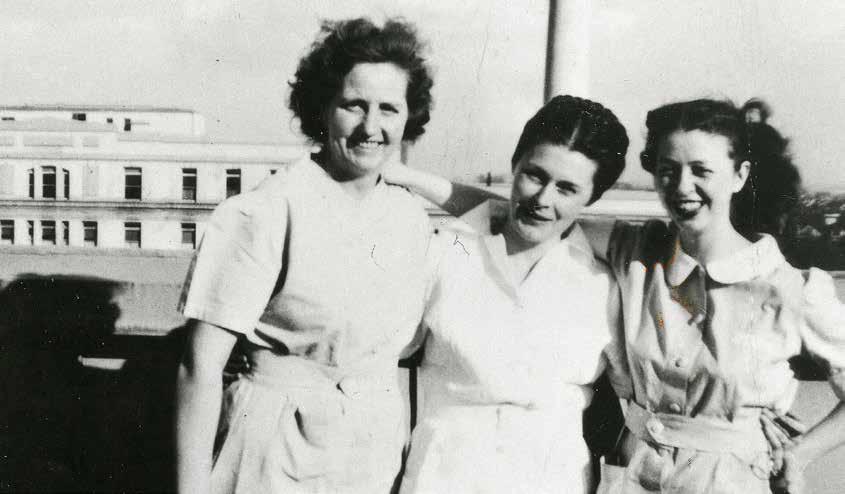
ON OCTOBER 12, the multi-union Facilities Bargaining Association (FBA) announced that members voted 64 per cent to ratify a new three-year collective agreement with B.C.’s health employers.
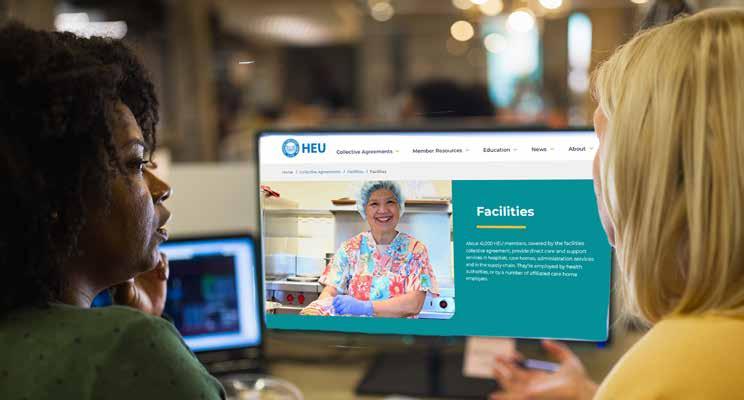
Covering more than 60,000 health care workers – the vast majority members of HEU – the agreement includes a significant compensation package including cost of living adjustments (COLA) and new and improved premiums and allowances.
There are also provisions to address serious staffing shortages and turnover in the sector including a commitment to add an additional 9.25 million hours of staffing, adding thousands of new regularized positions to the bargaining unit by 2024.
Additional provisions in the agreement include more access to training and education, improvements to workplace safety, and new language to foster greater inclusion and diversity in the workplace, including concrete measures to support Indigenous workers.
HEU secretary-business manager Meena Brisard says employers must move quickly to implement measures in the agreement that promote higher staffing levels and safer workloads.
“Workers on the frontlines of health care are exhausted and they need resources and support if we are to have a sustainable health care system going forward.”
The three-year agreement is retroactive to April 1, 2022, and as the Guardian goes to press, members have started to see retro pay on
their payroll statements.
A major feature in this new agreement is the wage comparability review which will begin the process of addressing historic wage cuts legislated by the B.C. Liberal government in 2004.
Those rollbacks wiped out a decade of pay equity adjustments.
Brisard says the union will be meeting with health employers and government early in the new year to begin this work which will phase in more than $10 million in permanent wage adjustments to targeted classifications in April 2023, rising to more than $15 million by April 1, 2024.
The review will make recommendations on how to continue this work in the next round of bargaining.
The eight-union Community Bargaining Association (CBA) –covering 21,000 health care workers, including about 2,300 HEU members – paused bargaining with health employers in November over a lack of progress on key bargaining demands.
The CBA declared disappointment in the compensation being offered compared to what facilities members achieved in their recently renewed agreement.
As the Guardian goes to press, the CBA has accepted an offer to return to the table on January 10 to hear a new offer being presented by the Health Employers Association of BC.
On October 28, contracted support services workers at 24 sites in Vancouver Coastal were brought back into the public service, the final groups to be reunited in this phase.
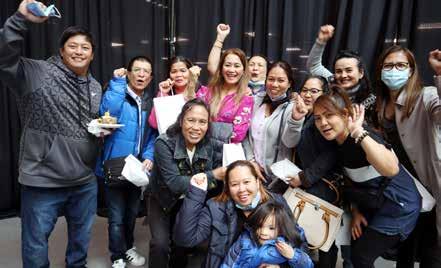
The move began in August 2021, when B.C. Health Minister Adrian Dix announced the province would cancel 21 commercial contracts across four health authorities and Providence Health.
Thousands of workers gained improved wages, job security and working conditions, as they returned to the employ of the health authorities.
The nine-union Community Social Services Bargaining Association (CSSBA), who represent 17,000 unionized workers, including 1,500 HEU members, have not been at the bargaining table since early November, but plan to resume talks in January.
The bargaining committee called discussions to date “challenging” and feels progress is stalled on members’ fundamental priorities, including a fair and equitable compensation package, meaningful recognition of rights for Indigenous workers and mental health supports.
As the final group of contracted support services workers at public hospitals are brought back inhouse, the provincial government has announced its commitment to extend the plan to workers at public-private partnership (P3) sites in the Fraser Health region.
This means that hundreds of Sodexo and Aramark workers at Abbotsford Regional Hospital and Cancer Centre and the Critical Care Tower at Surrey Memorial will be reunited with the health care team in 2023.
ON APRIL 6, the B.C. government passed amendments to the Labour Relations Code to permit automatic certification of workplaces without the need for a representation vote.
To be eligible for automatic certification, 55 per cent or more of employees in a bargaining unit must demonstrate they wish to be represented by the applicant union.
This process is also known as “card check” and was the law in British Columbia prior to 2001 when the BC Liberals abolished it.
Secret ballot votes will still be used in cases where between 45 and 55 per cent of employees support certification. If fewer than 45 per cent wish to be represented by the applicant union, then the union’s application for certification will be dismissed by the Labour Relations Board.
The ability of employees to collectively organize is a fundamental right and is recognized by the Canadian Constitution
The implementation of “card check” removes the duplication of holding a secret-ballot vote when a clear majority of employees have already demonstrated they wish to certify.
It also limits opportunity for employers to interfere with the certification process or put pressure on workers not to unionize.
The revival of “card check” in B.C. also aligns the province with the automatic “card check” system under the Canadian Labour Code, which regulates federal employers.
However, under the federal legislation, unions must only demonstrate a majority of employees wish to be represented by the applicant union to receive automatic certification without the requirement for a representation vote.
EMILY RAVEN
WORKERS’ health and safety is a top priority at public sector bargaining tables in B.C. And employers are now recognizing the critical need to address mental health and psychological safety in the workplace.
That’s why the Facilities Bargaining Association (FBA) and the Health Employers Association of BC recently renewed their commitment to the Enhanced Disability Management Program (EDMP), a joint union-employer initiative to support ill or injured workers to remain at work or return to work in a safe and timely manner.
HEU members in the facilities, community health, nurses, and health science professionals bargaining associations are covered by the program.
Participation is mandatory for full-time and part-time employees who have missed one shift due to workplace illness or injury, or have missed five consecutive shifts due to a non work-related issue.
Casual employees and regular employees, who are struggling at work but don’t meet the criteria, can self-refer to the EDMP.
How does it work?
If you’re injured on the job, you must inform your supervisor and WorkSafeBC.
In its 2021 announcement ending commercial contracts with private contractors, the government did not include P3 sites.
One exception is the Patient Care Centre at Royal Jubilee Hospital on Vancouver Island, that was brought back in November 2021.
HEU continues to push for P3 workers in all regions to be reunited with the health care team, and to advocate for an end to privatization for all health care workers, including housekeeping staff working in the P3 Teck building at the B.C. Children’s and Women’s Hospital.
Each academic year, HEU awards a number of bursaries, sponsored by union locals and HEU’s Provincial Executive (PE).
They’re available to members, their children, stepchildren and legal guardians, and spouses, including common-law and samesex partners, who need financial assistance and demonstrate satisfactory academic standing.
They can support courses at any post-secondary educational institution, and are administered by a bursary committee under the
PE’s direction.
This will trigger a referral to the disability management team or workplace health team.
The employer’s disability manager will contact you to ask questions about the nature of your illness or injury, and send you information, including contact details for your assigned EDMP steward.
EDMP stewards are HEU members who are assigned to health authorities and work sites. The steward will contact you and ask the same questions. This may feel redundant, but it’s critical the employer-union disability management teams work together to best support workers.
Your supervisor only needs to know the dates of your absence, and any restrictions or limitations on your return to work.
Under privacy laws, they’re not required to know your diagnosis. Only the EDMP team will have that information on a need-toknow basis, and it’s kept strictly confidential.
EDMP stewards are there to assist and advocate for workers. Find more information at heu.org/enhanced-disability-managementprogram.
Here are the 2022-23 recipients and their sponsoring locals:
$350 bursaries: Brandon Lau (UBC), Megan Lindquist (Victoria General), Kimberly Tronrud (Royal Columbian - Bill Black), Jasdeep
Dhaliwal (Royal ColumbianBeckie Dyer)
$500 bursaries: Halima Moshood (PE – Alex Paterson Memorial), Hailey Krueger (Vancouver General), Aqeel Safdari (Vancouver General), Caroline Wood (Hrabarchuk) (Royal Jubilee), Ma Zainah
Nicole Ang (St. Paul’s - Robert Standell), Breanna Ashdown
(PHSA Amalgamated – Cathy Peters Memorial), Dryden Dhami (PE), Chloe Latosky (Richmond), Dawna Kooistra (Burnaby), Megan Cyr (PE - Ginger Goodwin), Julie Mossey (Maple Ridge - Tara Hansen Memorial), Finn Carlson (Prince George), Veronica Droogendijk (People with Disabilities Standing CommitteeCathy Peters Memorial).
$1,000 bursaries: Thi Anh Khue Do (PE), Le Yan Du (PE), Shyla Jhalli (PE), Paige Carlson (PE), Malik Dhami (PE), Netanya Quessy (PE), Hannah Shiels (PE), Jenna Thiessen (PE), Abigale Christianson (PE), Michelle
THE B.C. MINISTRY of Health has confirmed wage-levelling will continue after the order restricting workers to a single seniors’ care site expires at the end of this year. Workers will be free to work at more than one seniors’ care site as of January 1, 2023.
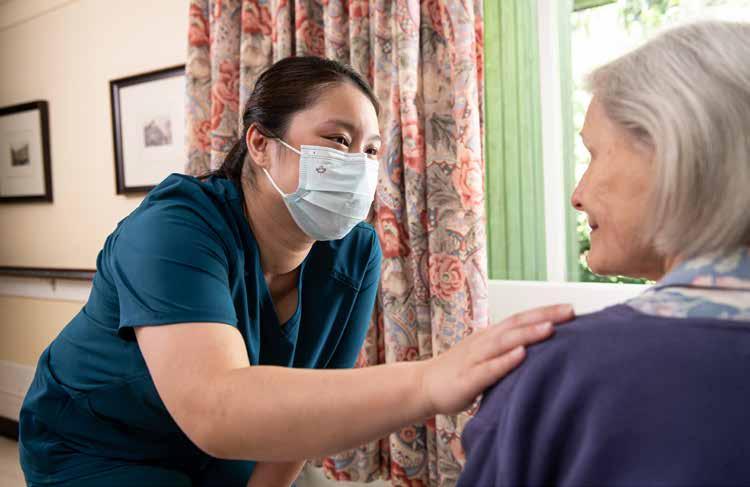
Maintaining wage-levelling is welcome news, as there were concerns that ending the Single-Site Order could mean a return to low wages and have a significant financial impact on workers and their families.
“Keeping wage-levelling guarantees economic equality for seniors’ care workers across the province,” says HEU secretary-business manager Meena Brisard. “It ends a massive disparity in the system that began under the BC Liberals 20 years ago, ensures members don’t face undue financial hardship, and maintains continuity of care for seniors and residents.”
Levelled-up wages are tied to facilities collective agreement wage rates, meaning workers under other collective agreements will see a boost to their paycheques to reflect the increase in the recently renegotiated facilities agreement. Brisard noted that workers will see a retroactive payment of wages back to April 1, 2022.
The levelling up of wages in the sector is made possible through government subsidies to private, low-wage care home operators.
The Single-Site Order, issued in 2020, restricted staff in seniors’
care to working in one facility only, to help stop the spread of COVID-19.
Since many workers held jobs in both public and private facilities, HEU worked with the Ministry of Health to develop a framework to help protect their seniority and maintain their income.
Two decades of privatization and under-investment by the for-
mer B.C. Liberal government left the province with a fragmented and highly privatized seniors’ care sector. Before wage-levelling, care homes had widely varying wages and working conditions – a care aide could earn up to seven dollars less per hour than one at a different work site.
The union’s Care Can’t Wait campaign is pushing for funda-

mental changes to this sector to restore common standards for working and caring conditions. The union calls for more accountability and transparency by forprofit operators for their funding, and to build more non-profit and public capacity.
TAKE ACTION at carecantwait.ca. Or hold a local Care Can’t Wait event by emailing act@carecantwait.ca.
SARA ROZELLAddison (PE), Lauren Kirkey (PE), Logan Martin (PE), Lucy Morris (PE), Marisa Briglio (PE), Jordan Nestor (PE), Brandie Boyd (PE), Alexandra Rice (PE), Sydne Smith (PE), Kendra Mackie (PE), Cassandra Torsti (PE), Jiyoung An (Surrey - Iris Andrews Memorial), Lauren Askew (PE and Surrey - Ray McCready Memorial), Fe Carbonquillo (PE and Surrey - Edward James Ashmore Memorial).
The union warmly welcomes 272 new members at Creekstone Care Centre and The Village Langley.
A total of 901 members chose to join the HEU family this year. They work in long-term care, assisted living, adult residential care, and community social services. Since “single-step certification” was introduced, HEU has received automatic certification to represent three groups: Society of Saint Vincent de Paul of Vancouver Island and Pro Vita and Compass workers at Creekstone Care Centre.
HEU’S EDUCATION and human rights department is dedicated to empowering members and opening doors to activist and leadership opportunities for all. Education reps Victor, Kyra, Juli, Ela, Jennifer, Linda and (not shown) Carolyn and Sharryn, along with admin team Shemaine, Deanna and Morgan, deliver workshops, design conference content and support the union’s equity projects.
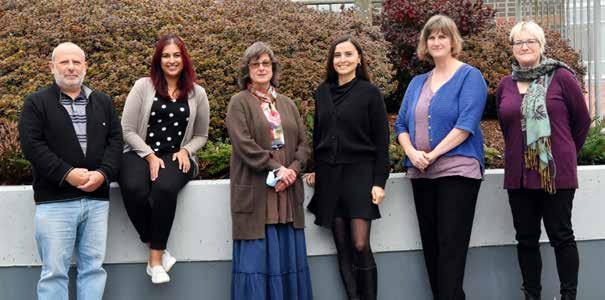
When challenges seem overwhelming or even impossible, let us never forget that doing the impossible is the history of HEU.
I AM HONOURED to have been re-elected as your financial secretary at the recent HEU convention.


Nothing truly prepares anyone for the job of financial secretary, but my university degree from the Philippines plus extensive local accounting and finance experience has helped me big time.
Education was a gateway to opportunity for me. I want every HEU parent to be able to afford a college education for their children. No child should ever have their dreams deferred.
I am pleased to continue to bring my open, informal and accessible style to the role. While some members and staff have referred to me as the boss, I am not the boss. You, the members, are my boss.
I draw my strength and inspiration from you.

Each invoice, cheque, letter, email, or phone call that lands on my desk, every decision I make, is about more than numbers. I think of the programs, services and benefits that will improve the lives of HEU members.
We have a lot of work ahead of us, in many areas.
We want to see real improvements to the seniors’ care sector, and we’re lobbying for common standards and wages through our Care Can’t Wait campaign.
This year has seen thousands of contracted support services workers return back in-house, and now our goal is to do the same for workers at P3 hospitals.
And I want to prioritize training for local trustees. They’re an important part of the finance team, and they need support.
Through all these efforts, it’s essential to continue our work in truth and reconciliation with Indigenous Peoples, and to strengthen our solidarity through diversity, equity and inclusion. We rise together by standing together.
And I want to see us focus more on addressing climate change. Floods, droughts and wildfires threaten our children’s futures. We must learn to be good citizens of this planet.
I will not rest, I will not let up, until I see security and stability for all our members.
When challenges seem overwhelming or even impossible, let us never forget that doing the impossible is the history of HEU. Thank you for trusting me with the task of being your financial secretary for another term.
This year, we had more applications to our local project fund than in the last 20 years combined.
MY FAVOURITE PART of the job as HEU president is working with local leaders.
A big part of that centres around local revitalization, particularly after two years of a pandemic that took its toll on exhausted volunteers and members.
I am dedicated to keeping my boots on the ground – attending local meetings and events, hosting skill-building webinars, and designing manuals and processes to help support local leaders.

I get my energy from providing one-on-one support. I talk to 10 to 15 locals a week. One thing I hear is that local officers need access to more training, so we’ve expanded our education opportunities.
This year, we had more applications to our local project fund than in the last 20 years combined. Locals are engaging, and momentum is building.
This is in part because of our collective work to educate members. The more we help members understand how the union and constitution work, and the more accessible we make our union’s resources, the more members will pick up those tools, enforce their rights, and enjoy their privileges.
I know with union support, every single HEU member has the capacity to become a leader – they may just not know it yet.
That’s what happened to me. When I was a licensed practical nurse, and the BC Nurses’ Union launched their raid on LPNs, I went to a union meeting and demanded to know what HEU would do to protect my profession.
Instead, I was asked, “If we give you the support you need, what are you willing to do to fight for it?”
I left that meeting a union activist.
Labour leader and civil rights activist Delores Huerta once said, “Every moment is an organizing opportunity, every member a potential activist, every minute a chance to change the world.”
Union power comes from you. My promise to you in my next term as president is to continue to invest in our locals and activists. We need to build the next generation of HEU leaders. This is our key to collective power. This is how we make health care better for everyone.
I am so proud of our HEU locals and the executives who keep them running. Thank you for everything you do to make this union strong.
Betty Valenzuela | Financial Secretary Barb Nederpel | President PRESIDENT’S DESKThe Ministry of Health’s announcement to hire 320 in-house protection services officers to address violence in B.C. hospitals is welcome news for many workers and unions.
“Injuries from incidents of aggression or violence are the second largest reason for time lost at work, especially for our care aides,” says HEU secretary-business manager Meena Brisard.
“In fact, nearly two-thirds of all WorkSafeBC time-loss claims due to acts of violence are in the health care sector.”
una Lafontine has worked security since she was 17, and has been a protection services officer (PSO) in Victoria-area hospitals for five years.

Lafontine says she’s aware of at least one “Code White” per day – the term hospital staff use to call for assistance in situations with aggressive patients or residents.
“Regardless of the reason we’ve been called, establishing rapport with a person is really important,” says Lafontine. “Of course, the uniform can really set the tone of a conversation, especially if somebody has had a poor experience with somebody in uniform.
“But protection services is unique in that we have a heavy emphasis on patient care. There are a lot of things we can offer, that nursing staff might be too busy for, like provide a blanket, or tell patients what resources might be available when they leave the hospital.”
De-escalation is always the goal.
“I put an emphasis on listening and being patient, and getting as much background information as I can.”
Lafontine, who is training to be a paramedic, understands how medical conditions can affect behaviour. “If they have chronic back pain, they might be lashing out because they’re dealing with that pain. Or if they have a seizure disorder, that’s something that I need to be aware of.”
“I put an emphasis on listening and being patient, and getting as much background information as I can.”
LUNA LAFONTINE, PROTECTION SERVICES OFFICER
But despite all efforts, some situations become physical, especially when patients are brought to the hospital by police.
Yet the most disturbing incident Lafontine recalls involved a hospice patient’s agitated family member, who assaulted her as she tried to keep him from re-entering the building.
Lafontine and her partner both ended up on the ground, with the visitor “trying to get his arms around my partner’s neck.” Only when a third officer arrived were they able to restrain the man.
“Everything unfolded so quickly and I think, if I had been by myself, then that situation would have been pretty awful for me,” she says, adding that in smaller hospitals there can be as few as two officers available each shift.
PSOs carry no weapons. Lafontine wears a stab-proof vest and carries handcuffs, so she relies on her team for physical backup and mental support, especially in the aftermath of an incident.
She feels that the acuity of violence is becoming higher.
“Something that we see frequently is patients coming in with drug-induced psychosis. And a lot of those patients are managed in the emergency department and psychiatric emergency.”
This connection is echoed by frontline workers throughout the health care and social services system. Without effective mental health and addiction resources and treatment in the community, vulnerable people often end up at the hospital in a crisis.
resources in
Emergency staff, greeters and other public-facing workers experience the bulk of verbal abuse and threats, but violent incidents occur in all areas.
While support and intervention by security officers is an important safety measure, other factors like wait times, noise, crowded spaces and lack of privacy, are aggravated by ongoing staffing shortages.
“Short-staffed workers haven’t got time to observe and calm frustrated patients, and they’re often working alone in situations where there should be two for safety,” says Brisard.
“In these cases, the solution is more staff to provide focused care for those who may be anxious or afraid or agitated, but unfortunately our members have too many patients and residents to care for.
“That’s why we have to deal with the root problems, which is making sure we have enough mental health resources in our communities, so that this level of violence isn’t happening at the hospital.”
While all health care workers experience high rates of violence, care aides are one of the most vulnerable groups.
Julie Ovens has been a care aide at a Fraser Valley hospital for 30 years, with experience in long-term and acute care. Throughout her career, she’s witnessed more than 100 “Code White” situations.
“Our training is that as soon as you
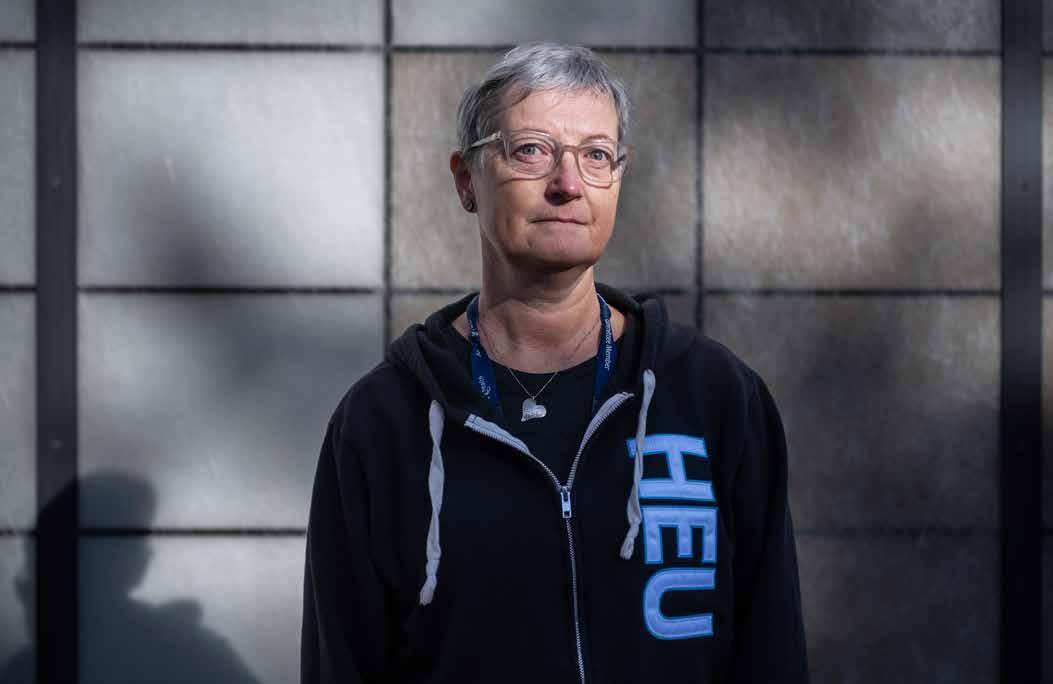
“Probably almost half our workplace health incidents are violencerelated.”
JULIE OVENS, CARE AIDE
PSOs carry no weapons, so Lafontine relies on her team for physical backup and mental support, especially in the aftermath of an incident.Jennifer Gauthier PHOTO
feel there’s a threat to your safety, you should proceed with the violence prevention safety procedure in your workplace,” says Ovens, a longtime OH&S and shop steward.
But unless there’s a recorded history on the patient, there may be no warning signs. And even if behaviour is escalating, care aides often find it hard to refuse care due to short-staffing.
“Care aides are trained to take care of the basic needs of people,” says Ovens. “So, if there isn’t a second person around to assist, you might feel compelled to start doing care by yourself. And that’s exactly what happened with one staff member who got really badly injured.
“The patient was flagged as AVP [aggression/violence prevention], so there should have been two people to take them for a shower, but there wasn’t a second person around. The patient seemed like they were having a good day, but once down in the shower, he got violent and smashed the worker’s head against the wall.”
Most injuries, Ovens says, are the result of workers being pulled or pushed.
“Probably almost half of our workplace health incidents are violence-related.”
Incident reports can include verbal abuse, but Ovens says staff are less likely to report verbal assault, or near misses. “People seem to just report if there’s actual contact with potential of injury.”
Medical conditions are also a factor in abusive behaviour. “Infections are number one. Maybe confusion, if they have dementia. But mainly it’s not getting their needs cared for. So, because of lack of staff, people can go a long time without getting a drink or having their pad changed or maybe not getting their food when they should.”
Besides adequate staffing levels, Ovens advocates for better training, and a stronger emphasis on incident follow-up and aftercare for workers.
“They offer counselling services, but they don’t really go that step further. People have to kind of do the digging themselves. And often the resident that’s injured the person is still there. It’s really hard to go back to work to that.”
In long-term care, developing care plans is a crucial part of keeping workers safe, says HEU OH&S director Georgina Hackett.
Residents can get agitated, anxious and angry if their daily routines are altered. Something as simple as where a mobility aid is placed, or how toothpaste is dispensed, can make the difference between a resident striking out in anger or feeling safely cared for.
his hands, talks to him a little bit, tells him we are there to help him, while the other one does the care. And we try to make it quick. That’s how we protect ourselves.”
Long-term care facilities don’t typically have onsite security services.
“Working as a care aide is not easy physically or emotionally,” Cora adds. “Communication is so important among the nursing team, and proper assessment to give the right approach.”
Although anti-violence training is valuable, Hackett says many factors are out of the workers’ control, especially short-staffing.
She says residents can benefit from mental health assessments, recreational activities or medication changes, all of which can become part of a care plan that puts a priority on keeping workers and residents safer.
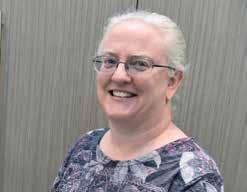
“Everybody needs to be involved in this,” says Hackett.
“And while post-incident procedures are important, they don’t prevent incidents. We want to prevent things from happening in the first place.”
Having enough staff to deliver care in twos, or to trade off tasks if a resident is becoming reactive with one worker, can also help prevent and de-escalate violence.
A care aide at a Coquitlam long-term care facility was off work for 10 days after a resident, who was already known to be unpredictable, struck her on the ear.
“He was being so calm and cooperative, and then he just swung his hand at my head,” says Cora, who has more than a decade of care aide experience. “I went to the nurse and reported the incident, and then I went home, because it’s not just the pain, it’s the trauma. I was shaking at that point.
“I returned to work, and I still take care of this resident, but I make sure that the second person is not a new or casual worker because sometimes they don’t know the residents.
“We kind of know now when he could react. We see his facial expression, and then we take more care. One of us holds
That’s why the Facilities Bargaining Association team worked hard to get new language in the collective agreement that gives workers the right to input on care planning for an aggressive patient or resident.
It includes the employer providing violence prevention refresher training, and strengthening reporting procedures on harassment from patients and visitors.
Although addressing violence is a complex task, PSOs have an important role in protecting frontline workers.
In the early 2000s, most hospital security jobs were contracted out to private companies. Protection services were brought back in-house in the Vancouver Island health authority several years ago.
“Protective services officers are a valuable part of the health care team and should all be under the same employer, not privatized,” says Brisard.
“It’s critical to coordinating our work on violence prevention across the health care workforce.”
Something as simple as where a mobility aid is placed, or how toothpaste is dispensed, can make the difference between a resident striking out in anger or feeling safely cared for.Everybody in the workplace needs to be involved in safety planning, says HEU OH&S director Georgina Hackett. Brenda Whitehall PHOTO ELAINE LITTMANN




PRESIDENT Barb
Nederpel clerk/care aide
Kamloops/ Thompson Local
Bill McMullan
1ST VICEPRESIDENT residential support worker Kardel Local
Talitha Dekker SENIOR TRUSTEE accounts receivable clerk








Kamloops / Thompson Local
REGIONAL VICE-PRESIDENTS
FRASER
Bonnie Hammermeister care aide
Surrey Local
INTERIOR
Heidi Collins care aide Vernon Local

NORTH
Lisa Crema
mental health / life skills support worker
Prince George Local
VANCOUVER COASTAL
Karen McVeigh care aide



Dogwood Local
VANCOUVER ISLAND
Ian Smith
technical analyst
Royal Jubilee Local
SECRETARYBUSINESS MANAGER
Meena Brisard
FINANCIAL SECRETARY
Betty Valenzuela
health records clerk
Vancouver General Local
Charlotte Millington
2ND VICEPRESIDENT technical analyst
Royal Jubilee Local
Donovan Adlam
3RD VICEPRESIDENT carpenter PHSA Local
SIX NEW DIVERSITY VICE-PRESIDENTS were elected for the first time at the October 2022 convention.
DIVERSITY VICEPRESIDENTS
Lynn Serhan INDIGENOUS PEOPLES care aide





Armstrong Local
Chris Batting SENIOR TRUSTEEELECT housekeeper
Prince George Local
FRASER
Scott McKay care aide

Chilliwack
Amalgamated Local
INTERIOR
Barb Shukin activity worker
F.W. Green Local
NORTH
Angela Sharf medical device
reprocessing technician
Prince George Local
VANCOUVER COASTAL
Louella
Vincent community support worker WHR Lower Mainland Local



Olivia Burgon TRUSTEE rehabilitation assistant

Queens Park Local
Cora Mojica
ETHNIC DIVERSITY
food service worker
Vancouver General Local
FRASER
Diane Tomei pharmacy technician
Chilliwack Amalgamated Local
INTERIOR
Monica Thiessen lab assistant
Shuswap Local
VANCOUVER COASTAL
Maria Lugs care aide
Richmond Local
VANCOUVER ISLAND
Phil Henderson cook
Trillium Local
Darlene Bown
PINK TRIANGLE care aide


Victoria General Local
Lisa Kreut
2-SPIRIT, WOMEN, NON-BINARY Christine
Edgecombe
PEOPLE WITH DISABILITIES
mental health worker
CHMA Fraser Local
Seyda Yalcin

YOUNG WORKERS community health worker
Coast/VRC Local
HEU’s Provincial Executive (PE) is elected by convention delegates every two years. The PE is responsible for implementing the goals and policies set by HEU’s membership, and guiding the work of the union between conventions.
PE members represent all regions of the province, and come from a variety of occupations and sectors.
THE ONTARIO education workers’ strike in early November was a historic win for workers across the country, say union activists and leaders, forcing the provincial government to withdraw controversial legislation that violated the right to collective bargaining.

The CUPE member strike, which lasted two days, saw workers – educational assistants, custodians, maintenance and library
The right to collective bargaining was confirmed by the Supreme Court of Canada in 2007 in a case won by HEU.
workers, secretaries, early childhood educators, educational assistants, and IT professionals – walk off the job on November 4 and 7.
The strike came after negotiations with the Doug Ford Conservative government broke down. Workers were seeking an 11.7 per cent annual wage increase, and higher staffing levels in schools.
The union gave the province five days’ notice of a strike. In response, the government tried to stop the job action by passing a hotly contested law, Bill 28
The bill sought to make it illegal for workers to strike, and to impose a four-year contract with an annual wage increase of 2.5 per cent for those making less than
$43,000 per year, and 1.5 per cent for those making more.
CUPE reported 126 political protests during the two-day strike, with 10,000 people attending a demonstration outside the Ontario legislature on the first day. Another 75,000 Ontario residents sent messages to the government through their Don’t Be A Bully campaign page.
On the strike’s second day, Ford’s education minister announced the government would repeal Bill 28 in its entirety and head back to the bargaining table.
Bill 28, which Ford called the Keeping Students in Class Act, was fast-tracked in the Ontario legislature right before the strike. Along with an imposed contract, it stipulated that if education workers went on strike, they would be fined $4,000 each per day, and the union $500,000 per day.
When the province initially passed the bill, it had to invoke the rarely used ‘notwithstanding clause’, which allows provinces to override sections of the Canadian Charter of Rights and Freedoms –the first time it had been used to pre-emptively end a labour action.
The right to collective bargaining was confirmed by the Supreme Court of Canada in 2007, when it ruled in favour of HEU’s challenge to the BC Liberals’ contracting-out legislation, Bill 29.
“Right-wing, anti-labour governments will seek to undermine the hard-won, charter-protected rights of workers,” says HEU president Barb Nederpel, who also represents B.C. on CUPE’s National Executive Board.

“That’s why union’s across the country united to oppose Ford’s
legislation.”
The parties returned to bargaining, and on November 20, a tentative deal was announced, providing wage increases of about 3.5 per cent a year. Members ratified the collective agreement in early December.
IN 2021, I was privileged to speak with women health care workers, including many HEU members, about their experiences during the pandemic.
My research, part of the broader Gender and COVID-19 Project, focused on women, who make up most of the health workforce and face particular challenges managing unpaid care work alongside their paid care roles. In Canada, women do two to three times more unpaid care – such as child care, cooking and cleaning – than men.
A topic that particularly resonated was moral distress – the experience of not being able to provide the care one feels is ethically required, due to external constraints.
For example, care aides spoke of the distress they experienced when, due to short-staffing, they couldn’t provide residents with regular baths. Housekeepers
In Canada, women do two to three times more unpaid care than men.
spoke of witnessing residents’ extreme loneliness and not being able to provide comfort, such as holding someone’s hand, due to physical distancing.
Women also spoke of moral distress related to unpaid care responsibilities, such as worrying about transmitting COVID-19 to elderly relatives or not having enough time with their children.
Previous research demonstrates moral distress is associated with an increased risk of burnout and causes health care workers to leave their profession.
Women health care workers in the study resisted the structures that caused moral distress by drawing on peer and union support and professional pride.
Read more at tinyurl.com/mryppkfm.
JULIA SMITH FACULTY OF HEALTH SCIENCES, SIMON FRASER UNIVERSITYelected Filipina leader. “We’re all affected by what happens elsewhere in the world – whether it’s the economy, the climate change, global health crises, or social injustices.
“I know firsthand growing up in the Philippines that it isn’t safe to be an activist or speak against political structures, but in Canada, we have freedom of speech and the right to organize, among many other privileges. That’s why we need to stand in solidarity and demand justice everywhere.”
Canada’s involvement in counterterrorism in the Philippines is related to its economic interests. The Philippines is an important trading partner, the third largest supplier of immigrants to Canada, and companies with major mines in the Philippines are listed on the Toronto Stock Exchange.
In 2018, when the National Task Force to End Local Communist Armed Conflict was created in the Philippines by then-president Rodrigo Duterte, advocates watched in horror.
Since then, human rights group Karapatan has documented about 400 extrajudicial killings, 204 of which were human rights advocates; more than a dozen disappearances, and around 2,000 false arrests.
The Philippine government is violating human rights using anti-terrorism funding from Canada, says Beth Dollaga, a Filipina-Canadian activist and vice-chair of the Canadian chapter of the International Council for Human Rights in the Philippines (ICHRP).

She says frequent killings, disappearances and arrests of labour organizers are among the violations.
“Philippine laws and the armed forces tend to protect and promote international trade and investments at the expense of its citizens,” says Dollaga.
The nation is among a group of Southeast Asian countries that received $13 million from
Canada between 2017 and 2021 for anti-crime and counterterrorism initiatives.
In June, the ICHRP sent a letter to Global Affairs Canada detailing the human rights abuses. It was also signed by the Hospital Employees’ Union, the Vancouver and District Labour Council, and several human rights and church-based organizations.
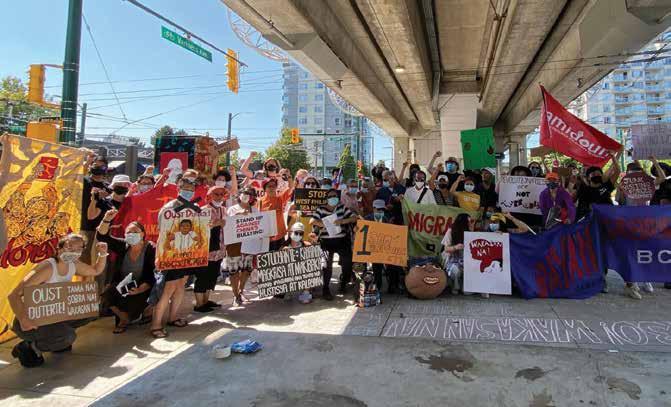
“Canadians tend to think locally, but we’re actually citizens of the world,” says HEU financial secretary Betty Valenzuela, the union’s first
The financial health of your pension plan is always top of mind, and members attending the Municipal Pension Plan AGM on October 13 left with assurances the fund is in solid shape.
The board will remove the cap on COLA increases for retiree pensions for the next three years. The percentage amount of the COLA increase will be announced early in 2023.
They also increased the amount in the rate stabilization account
to prevent future contribution rate increases for members and employers.
As well, a Climate Change Action Plan to address moving to low carbon investments will be released soon.
At the end of 2021, the plan had 227,493 active members, 72 per cent women. There were 118,048 retired members and 959 employers. The health sector is the largest in MPP’s Group 1.
Find the full annual report, as well as a recording of the AGM, at MPP.pensionsbc.ca.
“Labour organizers are being targeted,” says Dollaga, recalling the Bloody Sunday incident of March 2021, in which government raids led to at least nine deaths and several arrests.
Last May, organizers Loi Magbanua and Ador Juat disappeared after meeting with workers. Their families allege they were pulled from their vehicle by unidentified men and sent to a military camp.
“It’s a nightmare,” says Dollaga. “But we’re challenged to do more, and make at least a contribution to have a democratic, dignified way for the people to live.”
Sussanne Skidmore and Hermen
Kailley were acclaimed as president and secretary-treasurer at the 2022 B.C. Federation of Labour (BCFED) convention.

Skidmore is the federation’s first out and queer president, and Kailley its first secretary-treasurer of South Asian descent.
Skidmore previously served two terms as BCFED secretarytreasurer. Kailley was International Longshore & Warehouse Union Local 50’s secretary-treasurer.
Former president Laird Cronk
did not run for re-election. He is remembered for his leadership in fighting for paid sick days, stronger WCB provisions and singlestep union organizing.
Krista Zdrill has worked as a care aide at Village at Smith Creek in West Kelowna for 14 years. She’s also her HEU local’s chief shop steward.
The local organized in 2019, and Krista says it’s been a challenge to connect with the members — and the pandemic didn’t help. So this summer, she decided to work on engaging through team-building.
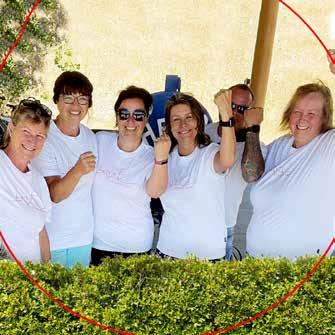
She refreshed their Facebook group into a learning place with resources, and offered incentives to join. To build engagement, Krista reached out to the different departments and workers at the site. Attendance at local meetings has risen, and is now regularly reaching quorum – the number needed to vote on decisions.
“As a member, the success has made me proud. I want to continue to educate myself and assist others accessing HEU opportunities,” says Krista.
The plan for 2023 is to create hybrid meetings, run the elections early, and encourage members to strengthen their skills by participating in workshops. So far, she says, there are five members applying to the CLC Winter School.
Krista’s advice to other locals includes, “take part in community events, find workshops for you and other members, and communicate through a Facebook page.”
KIM CHARTIERShelter support isn’t your typical nine-to-five job. For Kadidja Youssouf, working at Powell Place in Vancouver’s Downtown Eastside, it means providing a safe communal living space for women, using a harm reduction model and trauma-informed focus.

The most satisfying part of her job, she says, is empowering women to succeed in their lives and supporting them on their journey.
The worsening drug crisis has impacted working conditions significantly, and workers like Kadidja find themselves taking on a first-responder role.
With toxic drugs comes violence, psychosis, and suicidal tendencies. The shelter staff must do extra checks, regularly administer Naloxone and handle overdose deaths onsite.
“The most frustrating part of the job is the lack of resources regarding staffing and the impact the opioid and housing crisis has on the women at the shelter. It means losing women at an alarming rate, knowing their deaths could have been prevented,” says Kadidja.
“It’s challenging to contact 9-1-1. Often the ambulances don’t arrive because they, too, are short-staffed, which leaves our staff to deal with the overdose independently,” Kadidja continues. “We rarely have time to take breaks, making the work pile up and adding more stress.”
Kadidja, who is chair and shop steward at her St. James local, would like to see more staff training on CPR and oxygen tanks, and better support for workers’ mental health. There is a mandatory debriefing after a critical incident, but she says it’s not enough for the amount of trauma staff experience.
“Often the ambulances don’t arrive because they, too, are short-staffed, which leaves our staff to deal with the overdose independently.”
After a full day, Kadidja can be found healing through nature walks, taking hot baths and enjoying listening to music before she needs to wake up and do it all over again.
Her hope for the future? She believes access to a safe drug supply and adequate housing would address the issues of many women at the shelter. Ultimately, she hopes for a world where “all humans are safe.”
After years of advocating, residents and families will have more say in long-term care as government implements new regulations to strengthen the development and oversight of resident and family councils.
The regulations will ensure residents and family members can share information and concerns, develop solutions and provide input on decisions that affect them and their loved ones.
Changes include requiring oper-
ators to meet more frequently with resident and family councils. And health authorities will oversee the formation of new regional councils to address problems.
While these changes are coming after the COVID-19 pandemic highlighted the issues in longterm care for a broader audience, family councils have advocated for these changes since 2015.
Kim Slater, founder of Family Councils of B.C., says the changes “empower the voice of the very people experiencing long-term care.”
B.C. has a new payment model for family physicians replacing the current fee-for-service structure in place for decades.
The deal was reached amidst a massive doctor shortage in B.C., where nearly a million people are without a family doctor.
Many are instead seeking primary care from specialists and hospitals, overwhelming emergency rooms, or from walk-in clinics and urgent primary care centres, where they miss out on
more longitudinal care.
Under the new model, family doctors would see a substantial increase in annual salary, from $250,000 to $385,000. But rather than being paid per patient visit, pay will be based on time spent with patients, complexity of care, number of patients attached to their practice, and overhead costs.
Built into this new model are incentives for family physicians to spend more time with patients, keep patients in their practice for longer, and rely more on teambased care.
KIM CHARTIER
Shelter support worker Kadidja Youssouf’s work in the Downtown Eastside puts her in the centre of the deepening crisis of housing and toxic drug supply.
The PHSA print shop in the basement of Vancouver General delivers design and printing for forms, flyers, signage, booklets, even COVID-19 vaccination cards. A second print shop at the Langley Distribution Warehouse does the same for Fraser Health.
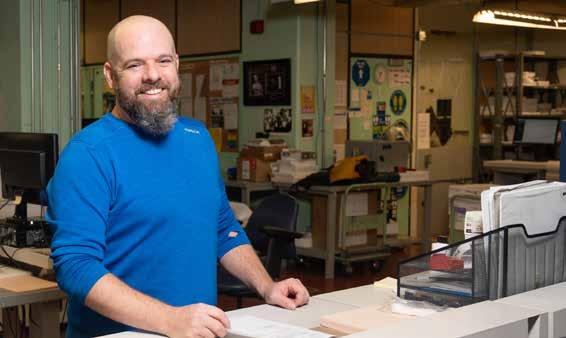
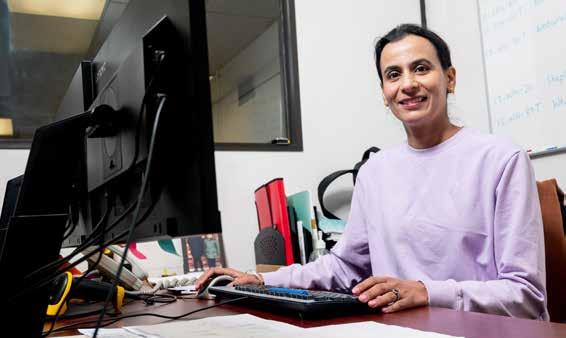
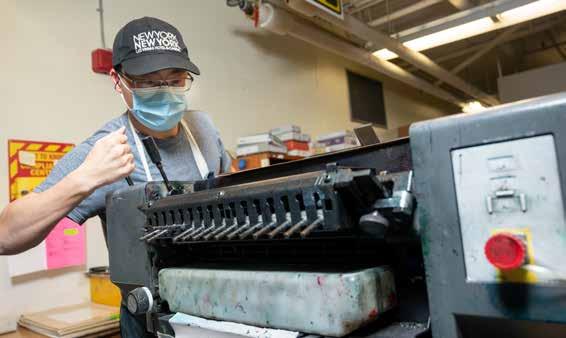
Colouring generates mindfulness and quietness, which allows your mind to get some rest after a long day at work. Grab a pen, pencil or crayons to shade and colour this artwork.

HEU MEMBERS:
Send us a photo of your colouring to be entered to win a prize!
Email a photo to members@heu.org, with the subject line: “Coffee Break Colouring Contest” or use this QR code.
Contest deadline January 31, 2023.

Gordon Freeman retired in July after working more than 30 years as a resident care attendant at St. Vincent’s Hospital Langara.
Active in the union, Gordon was a shop steward and also held other positions such as conductor, trustee, warden, vice-chair and assistant secretary-treasurer. He attended the last two HEU conventions before his retirement as well as the equity conference in 2019.
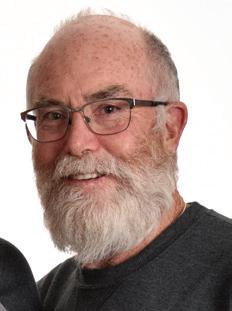
“Caregiving in a residential setting offers a continuous opportunity to help relieve suffering and the intrinsic rewards of that are many,” says Gordon. “I will miss countless individuals, residents, their supporters, and co-workers, memories of whom I take with me.”
After retirement, Gordon plans on spending more time in his kitchen. He will continue as an advocate for social justice, including the context of nonhuman animals.
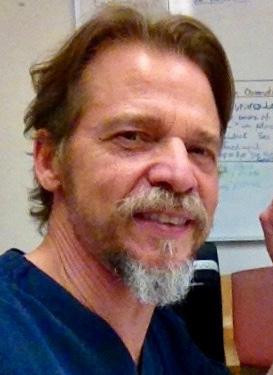
After more than 34 years, Cristina Gavilan retired this past September from St. Vincent’s Hospital Langara where she worked as a unit coordinator.
Previously, Cristina worked at Shaughnessy Hospital and Brock Fahrni as an LPN. She then worked at St. Vincent’s Heather and Youville as a unit coordinator.
Being quite active in her local, Cristina held many positions. She was the local chair for many years, and switched to secretarytreasurer in her final years. She was also an OH&S steward, shop steward and chief shop steward for many years.
“Being able to care for people is what I liked most about my job,” says Cristina. “I will miss the friends I made along the way.”
During retirement, Cristina plans to spend



50,000 members in 296 locals
more time with family and do some travelling. Eventually, she plans to return to part-time work as she functions best when she is in a work environment.
Longtime member and HEU activist Tom Ovens retired from Chilliwack General Hospital this year after almost 30 years working as a care aide. Tom has served the Chilliwack Amalgamated local as chairperson, vice-chair, shop steward and chief shop steward, and sat on the Provincial Executive Men’s Committee.
Tom says he “enjoyed socializing with patients and staff, and having the time to explain situations to the patients. My last 20-plus years were spent in emergency, and I enjoyed the diversity and challenges.”
In retirement, he’ll enjoy “slowing down and not working, doing what I want when I want, and spending more time with my granddaughters and family.”
Donna Dickison passed away in October. Her time at HEU was as a care aide at Haro Park, where she was active in the union and attended many conferences and workshops.
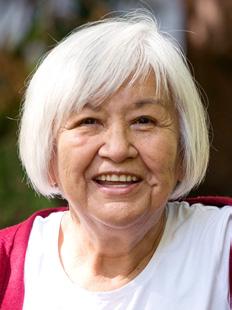
Donna was an activist, a compassionate protester, and advocate for human rights. She gave many talks and presentations, and shared her story as a residential school survivor.
Her experience as a founding member of HEU’s First Nations Standing Committee in 1996 was profiled in the Fall 2021 Guardian One colleague described Donna as having kindness, compassion, resilience and dignity. “Donna was one of those special human beings that leaves a deep mark on whoever was lucky enough to have known her.”
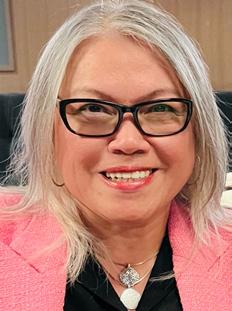

Did you know that HEU has six equity standing committees? Working with HEU’s equity officer, they provide outreach and advocacy to HEU members, and work in solidarity with other social justice groups.
To learn more, call 1.800.663.5813 to speak with HEU’s equity officer, Sharryn Modder.
Ethnic Diversity • Indigenous Peoples
Pink Triangle • People with Disabilities • 2-Spirit, Women and Non-Binary • Young Workers
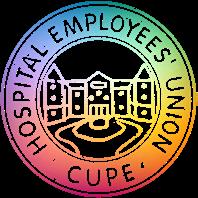
EDITOR
Caelie Frampton
MANAGING EDITOR
Elaine Littmann
ASSOCIATE EDITOR
Brenda Whitehall
GRAPHIC DESIGNER
Elaine Happer
PRINTING
Mitchell Press
PROVINCIAL EXECUTIVE


BARB NEDERPEL
President
MEENA BRISARD
Secretary-Business
Manager
BETTY VALENZUELA
Financial Secretary
BILL MCMULLAN
1st Vice-President
CHARLOTTE MILLINGTON
2nd Vice-President
DONOVAN ADLAM
3rd Vice-President
TALITHA DEKKER
Senior Trustee
CHRIS BATTING
Senior Trustee-Elect
OLIVIA BURGON
Trustee
BONNIE HAMMERMEISTER
Regional Vice-President
Fraser
SCOTT MCKAY
Regional Vice-President
Fraser
DIANE TOMEI
Regional Vice-President
Fraser
HEIDI COLLINS
Regional Vice-President
Interior
MONICA THIESSEN
Regional Vice-President
Interior
BARB SHUKIN
Regional Vice-President
Interior
ANGELA SHARF
Regional Vice-President
North
LISA CREMA
Regional Vice-President
North
LOUELLA VINCENT
Regional Vice-President
Vancouver Coastal
MARIA LUGS
Regional Vice-President
Vancouver Coastal
KAREN MCVEIGH
Regional Vice-President
Vancouver Coastal
IAN SMITH
Regional Vice-President
Vancouver Island
PHIL HENDERSON
Regional Vice-President
Vancouver Island
LYNN SERHAN
Diversity Vice-President
Indigenous Peoples
CORA MOJICA
Diversity Vice-President
Ethnic Diversity
DARLENE BOWN
Diversity Vice-President
Pink Triangle
LISA KREUT
Diversity Vice-President
2-Spirit, Women and
Non-Binary

CHRISTINE EDGECOMBE
Diversity Vice-President
People with Disabilities
SEYDA YALCIN
Diversity Vice-President
Young Workers
HEU OFFICES
PROVINCIAL OFFICE
5000 North Fraser Way
Burnaby V5J 5M3
604-438-5000
1-800-663-5813
EMAIL heu@heu.org
WEB www.heu.org
REGIONAL OFFICES
Vancouver Island
VICTORIA
201-780 Tolmie Avenue
Victoria, V8X 3W4
250-480-0533
1-800-742-8001
COMOX
6-204 North Island Highway
Courtenay, V9N 3P1
250-331-0368
1-800-624-9940
Interior KELOWNA
250-1815 Kirschner Road
Kelowna, V1Y 4N7
250-765-8838
1-800-219-9699
NELSON
745 Baker St. Nelson, V1L 4J5
250-354-4466
1-800-437-9877
Northern PRINCE GEORGE
1197 Third Ave. Prince George, V2L 3E4
250-564-2102
1-800-663-6539
HEU is a member of the Canadian Association of Labour Media

